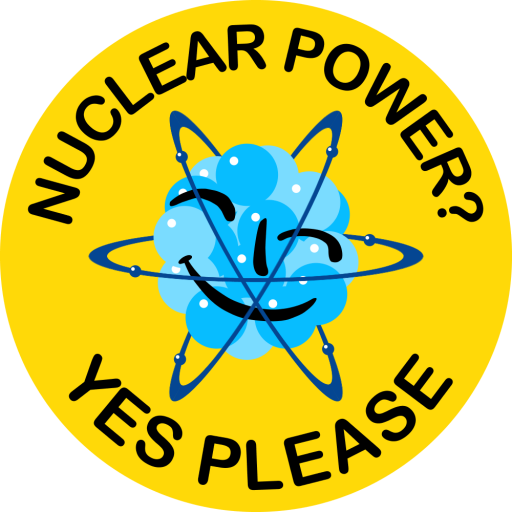One argument being used quite frequently against nuclear power here in NPYP’s home country Sweden is this:
If we do not allow uranium to be mined in Sweden, we cannot have nuclear power since it would be immoral to let people in other nations take the devastating environmental impact of the uranium mining.
This argument is flawed in many ways, which will take some time to get to the bottom with, so let me first summarize where the argument goes wrong:
- Unlike what is being hinted, we do not have a ban against mining uranium in Sweden.
- Uranium mining does not have a higher environmental impact other mining other minerals.
- We import other produce, products and commodities to Sweden as well, most of which like uranium are not locally produced.
First I should say that this argument is not actually used against nuclear power per se but rather being thrown in the face of proponents of nuclear power trying to mark them as hypocrites. This is a type of ad hominem attack, that is to say you’re not attacking a person’s arguments but instead the person itself in order to try to win the debate by default. This is, of course, a very dishonest and cheap way of doing debate.
Anyway… on to the flawed reasoning behind the argument.
Like I said, we do not have a ban on uranium mining in Sweden. What we have is a right for municipal councils to veto uranium extraction in that municipality. We do not have a general ban on uranium mining in Sweden. This means that unless the target of the argument has said that we should have a general ban on uranium mining in Sweden, the argument is dead in the water right there.
The second fault of the argument is to assume that uranium mining has a severe impact which causes unacceptable damage to people and the environment, and that uranium mining is worse than everything else. This too is wrong. All mining, no matter what you are extracting, can have quite a hefty impact and be very detrimental to both worker health and the surrounding environment if it is not done with care and caution. Indeed historical mining all the way up to the 70’s and 80’s have had severe problems with this.
Current mining in the early 2000’s however is different, and has all the protection and monitoring techniques needed to live up to any modern worker-, population- and environment protection standard out there. This includes uranium mining.
To illustrate by example: a Swedish miner in the LKAB iron mines in the 70’s received an accumulated yearly dose of radiation that was approximately 2000% higher than what an Australian uranium miner receives today.
It is simply just not true that we cannot do uranium mining without protecting people and the environment. We have all the tools that are needed. This still means that we have to ensure that they are used, of course, but they do exist.
The final leg of the flawed argument is the general notion that we cannot consume or use anything which we ourselves are not producing domestically, lest someone will call us hypocrites. This one is just plain stupid, because all I need to do is lift my eyes and look around me where I’m sitting to realize that not much of what I have in my room or indeed in my life, is produced domestically.
Take for instance metal, since that is produced in a nearly identical manner to uranium, which is to say: first you mine it from the ground, then you refine it. Metal is an integral part of our lives. Metal is all around us: in our computers, our furniture, appliances, jewelry, buildings, eating utensils, cars, keys, phones, power lines, wind turbines, water dams… there is metal just about everywhere.
Now I ask you, who use immense amounts of metal: are you prepared to have an iron mine in your back yard, with all the pollution and environmental hazards this implies? Are you prepared to have a steel mill as your next door neighbour with all the coal being burned in the furnaces to refine iron to steel?
You’re not? Well how can you be using all this metal then! Doesn’t that make you a hypocrite, just dumping all these environmental problems on someone else so you can sit there and read this very article on your metal-laden computer and its screen?
Of course you’re not a hypocrite. Or… maybe you are! How do you know you’re not? When was the last time you took the time to check that all the goods you’re using has been produced in a way that does not affect some other person or persons in an unacceptable manner? All this metal around you was once extracted from the ground in a mine. How do you know no-one suffered ill effects from this? How do you know that your lifestyle has not caused an environmental disaster somewhere?
With this you realize that you cannot go around and worry like that or you’d have to give up living altogether. There has to be a better way to deal with this issue than just saying no to everything that potentially caused problems when it was produced. And there is.
The ethics of importing goods, or indeed simply using goods produced by anyone other than myself, is a universal issue and it does not apply only to uranium. Uranium is not a special case and is subject to the same considerations as everything else (and then some more, since it is a controlled substance). And unsurprisingly, the Swedish nuclear companies does indeed have strict rules to abide by when it comes to seeing to that the uranium used in Swedish nuclear reactors have been produced in a sound manner that does not harm people or the environment in an unacceptable manner.
So in the end, does the argument turn those that do not want to have a uranium mine in their back yard but still want nuclear power into hypocrites? Does the argument successfully render their stance for nuclear power null and void? Must we produce uranium domestically just to have nuclear power?
No, we do not. It is a narrow-minded, simplistic and silly argument. The issue of assuring that the things which we use and consume in our lives are produced in an ethical manner is very important, and it is not being done any favours by the anti-nuclear lobby trying to dumb it down to fit their agenda. They are abusing the issue just to try to add some fuel to their waning struggle.
So don’t fall for it. Treat the issue with the respect it demands. And don’t let anyone try to abuse it just to push their point across unless it’s actually relevant.


Chris Busby and “The Tall Tale Of Ten Tons Uranium Gone Missing”
Published by Lantzelot on February 7, 2011Professor Chris Busby is a man that has made himself somewhat of a career in being the golden boy of nuclear opponents, saying just the things they want/need to hear. There is only one problem with this: he doesn’t have a foot to stand on when it comes to his tall tales about the evils of nuclear power. Previously we have exposed his claims that the Chernobyl disaster supposedly caused an increase in breast cancer in Sweden. This turned out to be an unfounded conclusion, based on frivolous interpretation of data along with some outright cherry-picking and willful suppression of data that didn’t fit the claim.
In the case of The Tall Tale Of Ten Tons Uranium Gone Missing, Busby and his colleague Cecily Collingridge have issued a report where they claim that there has been a leak of enriched uranium from the British nuclear power plants at Hinkley Point in the order of about 10 000 kg. We analyzed the data which he used to make his claim, and took the same steps as he did, following his chain of reasoning from data to conclusion. The result is hardly flattering for the Busby and Collingridge, because the claims they make hinge on…
– Unsupported postulates
– Sparse and highly uncertain data
– Graph fitting done on this data, while ingoring uncertainties
– Low resolution geological surveys
– Misreading of said surveys
– Ignoring local variations in said surveys
– Ignoring missing indicators that must be present if their claim was true
The full analysis can be found in our forum. But I’ll just cut right to the chase and ask the obvious question: how would 10 tonnes(!) of uranium go missing without anyone noticing? And more important: why didn’t anything else go missing? The data that Busby uses to make his claim shows barely detectable levels of fission products, such as Cobalt-60 or Cesium-137. Considering that uranium is a lot less mobile than these products, if uranium goes missing but not the fission products, there cannot be a leak in the reactors because any such leak would have seen more fission products escape than uranium.
This leaves only one path as to how 10 tonnes of uranium could escape into the environment: when reactor fuel arrived fresh at the plants, someone took some fuel elements aside, stripped them of their cladding, ground them to dust and blew them out over the surrounding areas. Alternatively someone made a bonfire with them. And all of it happened without anyone noticing.
Since this is clearly not a reasonable explanation, we must conclude that Busby and Collingridge are wrong: there has not been a leak of 10 tonnes of uranium from Hinkley Point. The data they rely on does not support the claim, and it is only through their frivolous interpretation of the data, misreading some of it, and making unsupported assumptions that they arrive at the claim.
This begs a final question: claims have been made that there are numerous health problems around Hinkley Point, such as an increased incidence of childhood leukaemia. If there are no leaks from Hinkley Point, how would this be explained? Well… to find that answer, maybe you should go ask the one person making the claims: a certain professor Chris Busby.
/Michael Karnerfors and Mattias Lantz – members of Nuclear Power Yes Please
13 Comments